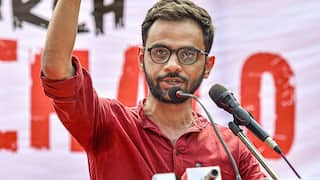Prashant Kishor Cites '2 Mistakes' For Wrong 2024 Lok Sabha Poll Predictions: 'Ready To Eat The Humble Pie'
Poll strategist Prashant Kishor has admitted to overestimating the BJP's performance in the 2024 Lok Sabha elections. He vowed to refrain from numerical projections in future elections.

Poll strategist and Jan Suraaj party founder Prashant Kishor has admitted that his predictions for the 2024 Lok Sabha elections were inaccurate, expressing his willingness to "eat the humble pie" for the errors in his pre-poll assessments. In his first interview with India Today TV following the Lok Sabha election results, Kishor acknowledged the miscalculations. "Yes, I and pollsters like me got it wrong. We are ready to eat the humble pie," he said.
Before the results were announced on June 4, Kishor had forecasted that the BJP would replicate its 2019 performance, securing around 300 seats. He even took a jibe at his critics, suggesting they "stay hydrated" and "keep plenty of water handy on June 4".
However, the results deviated from his predictions, with the BJP winning 240 Lok Sabha seats, 20 per cent less than its 2019 tally. The BJP formed a majority with the support of its NDA allies, crossing the crucial 272 mark.
When asked if he would continue making numerical predictions for future elections, Kishor responded, "No, I would not get into the number of seats in elections any more."
Kishor, known for his expertise in understanding India's political landscape, admitted his projections missed the mark in several areas. "I had put my assessment in front of you and I have to admit on camera that the assessment that I did was wrong in terms of numbers by a big 20 per cent. We were saying BJP would get somewhere close to 300 and they got 240," he stated.
ALSO READ | Amit Shah Advices Maha Dy CM Devendra Fadnavis Against Resignation, Asks Him To Continue
Prashant Kishor Cites 'Fear Factor' Among '2 Mistakes' Made By Pollsters Getting Election Predictions Wrong
The Poll strategist explained the complexities involved in converting vote share to seats and the impact of the "fear factor" in strong governments like Modi's. "In India, we are making two mistakes. The conversion of vote share to seats is far trickier than western existing statistical tools allow us to make... The second is the fear factor. The stronger the government is, the less likely you are to get the right answer," he said.
He also cited Andhra Pradesh as an example and told India Today, "For example, take Andhra, I called the election six months back that Jagan is losing big. You said the poor and women are sticking to Jagan. The ultimate result was far beyond what any of us could have predicted that means a lot of people who said they were voting for Jagan actually didn't vote for him. The fear factor is seen in strong governments like Modi's where people feel they could be at a disadvantage (for revealing vote preference). Sometimes pollsters are fooled or made to take the data that voters are going to vote for someone but they are voting for someone different."
When asked about his claim that the BJP would emerge as the largest party in Bengal, the Jan Suraaj Party founder remarked, "I got it wrong in four states—Bengal, UP, Rajasthan, and Maharashtra... But look at the vote share, BJP-led NDA is forming the government."
In a post on X, Kishor had confidently predicted the BJP's victory, advising his detractors to keep water handy on June 4. "Drinking water is good as it keeps both mind and body hydrated. Those who are RATTLED with my assessment of outcome of this election must keep plenty of water handy on June 4th," he wrote. More On It: 'Those Who Are Rattled With My Assessment...': Prashant Kishor Reacts To Row Over His Himachal Prediction
Now, reflecting on his recent errors, Kishor pledged to avoid numerical projections in future elections. "As a strategist, I should not have got into the number. I never used to. It is just in the last two years that I have made mistakes. Once I did it for Bengal and this (Lok Sabha elections) is the second time," he told India Today.
Related Video
Punjab News: AAP Leader Shot Dead During Wedding in Amritsar





































